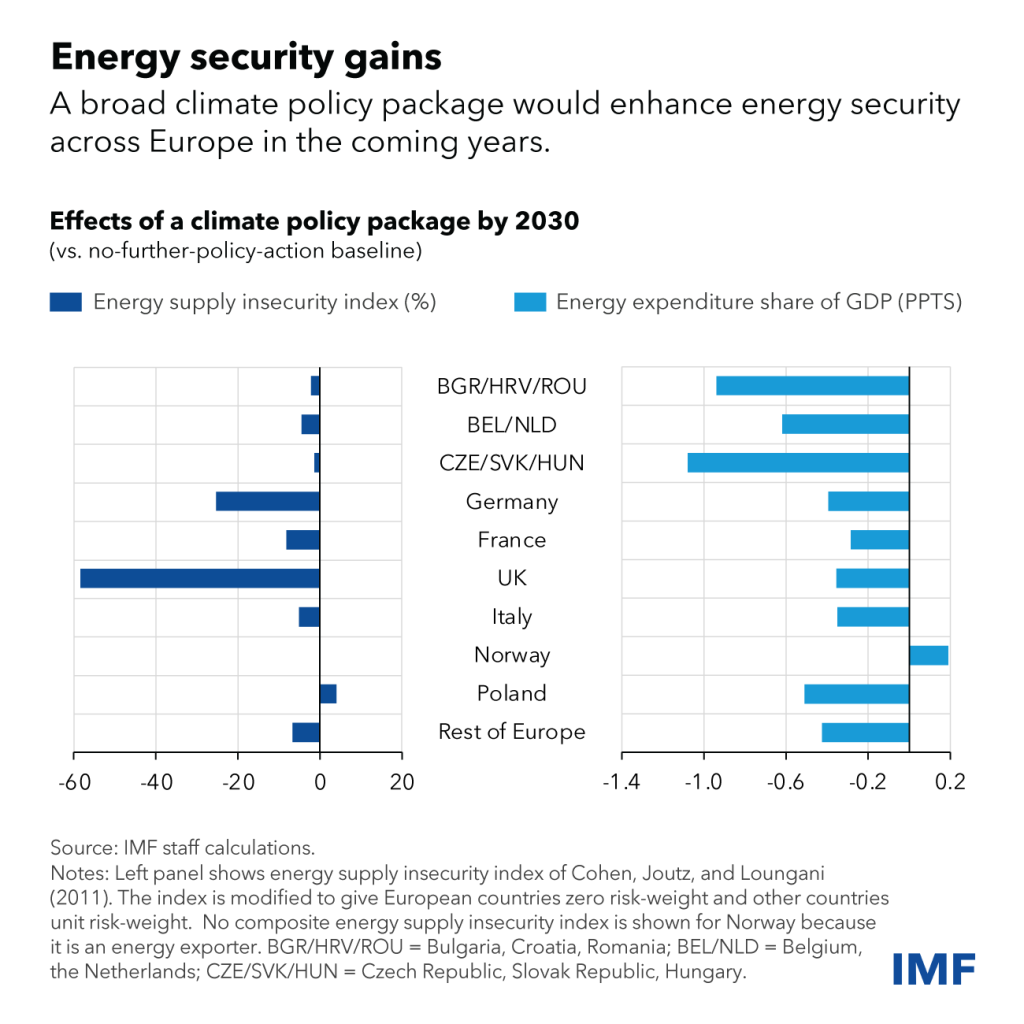
Meeting the continent’s emissions reduction targets could improve energy security metrics by 8% by 2030 – and that would be just the beginning.
Russia’s invasion of Ukraine triggered Europe’s worst energy crisis since the 1970s and put energy security back at the top of the political agenda.
Policymakers reacted quickly, securing alternative natural gas supplies, improving energy efficiency and expanding renewable energy. Reducing greenhouse gas emissions would not only mitigate climate change, but also enhance energy security. Skeptics, however, countered that this approach would increase the cost of energy, phase out safe (if dirty) domestic coal more quickly, and ultimately weaken the continent’s energy security.
So which view is correct? Our new research shows that strengthening Europe’s climate action also delivers considerable benefits in terms of energy security.
We weigh the effects of climate action on energy security in a global economic model with many countries and sectors. Simulates the impacts of emission reduction policies on two essential safety measures.
The first measure, security of supply, assesses the risk of a disruption in energy supply by combining how dependent a country is on imports for its energy consumption with how diversified those energy imports are. The second is the resilience of its economy to an energy disruption, represented by the percentage of gross domestic product it spends on energy.
Surprisingly, our analysis reveals that Europe’s energy security deteriorated in the decades before Russia’s invasion of Ukraine, as countries increasingly relied on imports from fewer and fewer suppliers.
The simulations also show that higher carbon prices, stricter sectoral regulations on energy efficiency and accelerated licensing for renewables would improve Europe’s energy security across these two key metrics. The effects would differ between policies, however:
- Carbon pricing reduces emissions at the lowest production cost to the economy, but may take some time to improve energy security in some energy- and emissions-intensive economies in Central and Eastern Europe if used as the only emissions reduction tool . This is partly because these countries have to phase out domestic coal sooner than they otherwise would.
- Stricter energy efficiency regulations for transport and buildings, on the contrary, they are less efficient than carbon pricing in reducing emissions, but provide greater joint energy security benefits. They also distribute these benefits more evenly across countries. Such regulations reduce energy consumption, as does carbon pricing, but they tend to further reduce the price of energy – and therefore overall energy expenditure. Combining them with support for poorer families – for purchasing more energy-efficient vehicles and home heating systems, for example – would make them more palatable and thus speed up implementation.
- Accelerating licensing Renewable energy also vastly improves energy security across Europe by expanding domestic energy supplies.
Packaging climate policies
A climate policy package that includes all of these tools is the most promising path forward because it combines the economic efficiency of carbon pricing with the greater and more equitable energy security benefits provided by regulations.
Specifically, a package of measures improves energy security in three ways. First, it reduces dependence on imports by replacing imported fossil fuels with domestically produced renewable electricity.
Secondly, it diversifies individual economies’ energy imports from non-European suppliers to European ones – through greater penetration of renewables and the electrification of end-uses such as vehicles and home heating systems in particular, given that European countries predominantly trade electricity with their European countries. neighbors.
And third, it reduces energy expenses because efficiency investments reduce demand and accelerated deployment of renewables increases energy supply – both of which lead to lower energy prices. This more than offsets the higher cost of setting higher carbon prices.
An illustrative policy package that reduces emissions by 55 percent compared to 1990 levels would improve both energy security metrics by around 8 percent by 2030 for Europe as a whole.

For the European Union, this package, which is consistent with the “Ready for 55” agenda, would reverse 13 years of deterioration in economic resilience to energy disruptions and eight years of reduction in energy supply security. As Europe continues to intensify its climate policy action beyond 2030, these gains will only increase.
Multilateral cooperation
The simulations also support the need for strong multilateral cooperation in Europe, as countries differ in their energy security gains and emission reduction costs (which in turn reflect factors such as their current energy intensity, energy mix and potential for renewable energy generation). ). A common mechanism that pools resources and coordinates green investments at EU level could accelerate the green transition at low cost and, at the same time, distribute its gains more evenly, notably through exploring cheap abatement options in emerging countries. of the EU.
The completion of the EU strategy for energy union is an example of this: better connection of national grids would reduce costs and help each country to import electricity from other member countries in case of internal disruptions, improving energy security for all.
At a time when the momentum behind climate action risks disappearing, European policymakers must consider its full benefits. By stepping up their individual emissions reduction policies as planned and strengthening their cooperation, they will not only continue to be global leaders on the path to net-zero emissions by 2050, but will also ensure an abundant and secure energy supply to power their economies in the future.
Via MFI
Source: https://www.ocafezinho.com/2024/05/31/a-europa-pode-colher-recompensas-consideraveis-ao-intensificar-a-acao-climatica/

